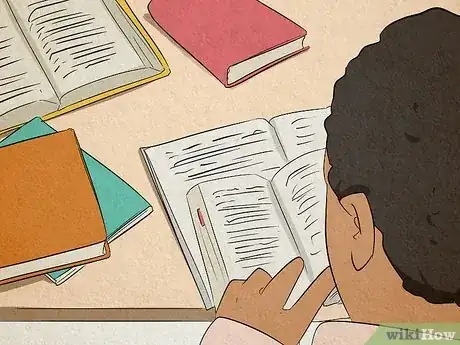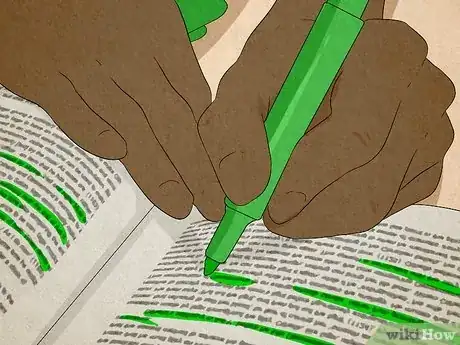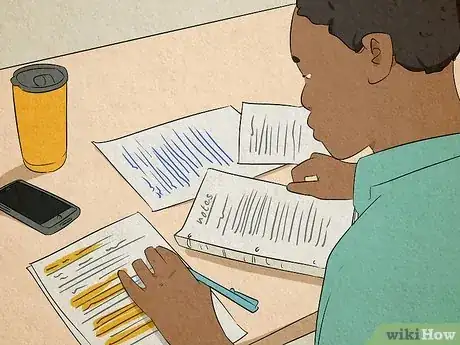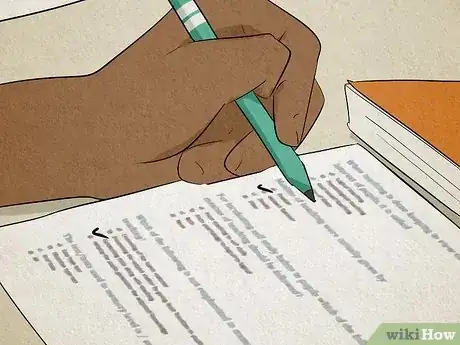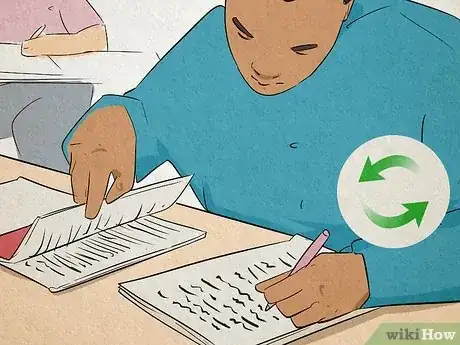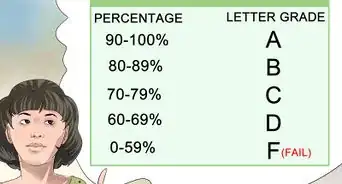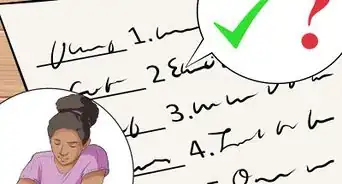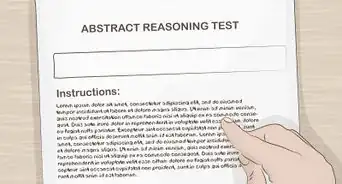This article was co-authored by Megan Morgan, PhD. Megan Morgan is a Graduate Program Academic Advisor in the School of Public & International Affairs at the University of Georgia. She earned her PhD in English from the University of Georgia in 2015.
There are 9 references cited in this article, which can be found at the bottom of the page.
wikiHow marks an article as reader-approved once it receives enough positive feedback. This article received 11 testimonials and 100% of readers who voted found it helpful, earning it our reader-approved status.
This article has been viewed 276,749 times.
An "open book exam" is a test that allows you to bring the text or material you have been studying. This may sound at first that all you will need to do is look up the answer the day of the test--and thus a very easy type of test to take. However, this is not how this sort of test typically works. In fact, these are often quite difficult, as an open book exam requires a genuine understanding of the material and be able to interpret, think critically, and present an organized and well written answer. But with a bit of preparation, note taking skills, and test taking strategies, you can succeed your next open book exam.
Steps
Preparing for the Exam
-
1Understand the rationale behind an open book exam. Open book exams do not rely on learn-and-regurgitate learning. Instead, you will have the information in front of you, but what you will be asked is typically quite involved. Open exams are meant to teach students how to take information and apply it in a thoughtful, deep manner. In an open book exam, the focus is not on memorizing information but applying that information. What this means for you is that you will not simply be summarizing material from a textbook. You will be interpreting it in the context of specific questions and scenarios.[1]
- For example, you will likely not be asked in a class about Shakespeare, "What is Romeo's family name?", more likely it will be, "Using citations, explain why Romeo's family contributed to his eventual death."
- There are generally two types of open book exams: a restricted type and an unrestricted type. In a restricted exam material is limited to specific documents, such as a single set of notes or single textbook. In an unrestricted exam, there is no limit on what can be brought into the exam room or take-home test. Make sure you know if your exam is restricted or unrestricted before taking the test.
- Memorization is largely unnecessary for an open book exam. However, this does not mean you do not need to study. This is not the case. Focus is shifted to understanding the material rather than simply being able to memorize and recite it. You will not be asked questions like, "Define X" but rather, "Explain how X applies to Y situation" or "What implications does X have on Y current event?" You should make sure you truly understand the material before entering the exam room.
-
2Locate and mark key information beforehand. If your exam permits you to take your book in, organize your textbook beforehand to help you locate key information quickly and easily.[2]
- If permitted, highlighters can be a great tool. Mark key terms, historical dates, equations, and other difficult to remember material that you might need to draw from for questions. You can flip through your book and easily spot the highlighted sections during the exam.
- Margin notes can also be a great means of organization, if allowed. Jotting down your instructors commentary or brief summaries of difficult paragraphs in the margins can help you spot important materials fast.
- Mark pages. Many people dog-ear important pages, but simple folding can be easy to miss. Try investing in multicolored sticky notes specifically designed for marking pages, which you can buy at most bookstores and department stores. You can even color coordinate any passages you're marking, using different colors to indicate different areas of focus.
- In the event of a restricted exam that does not permit a textbook in the exam room, these strategies still have merit. Organizing your book during the course of a class can help you easily spot key information while studying.
Advertisement -
3Strive to understand the material. Studying for an open book exam can be tricky as the skills required are not as easy to test as simple memorization. However, there are tricks you can use to make sure you're prepared for an open book exam.[3]
- Write your own commentary on information. As you'll be tested primarily on interpretation, write down your own commentary and insight in your notes. Challenge yourself to explain what you think about the material, and why. This helps hone your critical thinking skills, which will be needed for an open book exam.
- If your professor provided any model questions, answer them while studying. Open book exam questions promote a genuine understanding of the course material, so quizzing yourself using model questions is a great way to make sure you're prepared going in.
- Team up with other students. While study groups are great for any type of exam, they can be especially helpful for an open book. Rather than quizzing one another on materials, you can discuss and debate information from class. This helps you learn how to apply the information you learned.
Developing Note Taking Skills
-
1Attend all lectures and class periods. This should be obvious, but the best way to assure your notes are reflective of the testing material is to attend all lectures and class periods regularly.[4]
- Remember, an open book exam is not just memorizing material; it's striving to genuinely understand it. Each professor and teacher has a unique area of focus when it comes to covering reading materials. You can't replicate your instructor's preferences by studying the reading materials alone. You need to attend class.
- If you do not understand something, note this. Many people will make a notation, such as a big question mark to indicate an area which you do not understand. Leave a section in your notes to be filled in later. Ask other classmates or email your professor if you're struggling to understand this concept.
- It is OK not to be clear on something--a good teacher will be happy that you have questions.
- If you are still foggy on an area, it's also good to know that. If you have a choice of essay questions, it is good to be able to ascertain quickly which topic to write on.
- If your instructor talks fast, consider recording the lectures--with his or her permission first, of course. While you are probably unable to take recordings into a lecture hall, you can always listen after the lecture to try and better catch the material. Some teachers will actually record lectures so that you can review or make up classes, too.
- In the event you have to miss due to illness or emergency, have a friend or fellow classmate whose notes you can borrow. Ask someone you know is a good note taker and dedicated student rather than someone who misses frequently and appears disengaged in class.
-
2Organize your notes. You don't want to walk into your exam with a stack of papers covered in random facts and figures. Organize your notes during lectures and then again while prepping for the exam.[5]
- Use a system of enumerating and indenting your notes. Many people use roman numerals, using capital letters for headings and lower case for subheadings (e.g., IV and i.v.).
- Date all of your notes. That way, you can locate subjects that confuse you if you remember the approximate time of year they were reviewed in class.
- Keep your class notes separate. Use a three-ring binder or notebook to separate one class's notes from another or use a different notebook for each class.
- Write legibly. If you know your handwriting is sloppy, see if you can bring a laptop to class and type notes. Be careful, however. Many instructors ban laptops as they assume students are using them to disengage with class.[6]
- While you might be tempted to doodle during dull moments in class, try to refrain from doing so as these drawings will distract you later on while trying to study.
- Place material you struggle with at the beginning of your notes. This way, you'll have quick access to it during the exam. You should also list equations, key terms, and dates towards the beginning as this information can be tricky to recall and will likely show up on the exam.
-
3Focus on the important things. We're sometimes tempted to transcribe more or less entire books or entire lectures when prepping for open book exams. However, this method is not only incredibly time consuming it's ineffective. You'll end up scrambling through pages and pages of notes and run down the clock during exam time.[7]
- Pay attention to where the most focus is placed during lectures. If something is written on the board, repeated, or discussed for an extended period it will probably show up on the exam. Include those subjects in your exam notes.[8]
- Listen at the end of lectures. Oftentimes, your instructor will provide a brief closing statement that summarizes the most important takeaways from that day's class.
- Compare notes with classmates. If certain subjects overlap, these are probably important areas to focus your notes for the exam. You can also see what key issues you might have missed.[9]
Taking the Exam
-
1Stay calm. Exam anxiety can affect performance, so make sure you know good strategies to keep your nerves in check in the exam room.[10]
- Stop studying an hour before the exam and use this time to take care of yourself. Take a walk or eat something light. If you're poring over material right before an exam begins, you'll likely psych yourself out.
- Know the time and place of the exam and give yourself extra time to get there. Getting lost or running late can increase anxiety and affect performance.
- Get a good night's sleep before the exam. Anything that affects you physically can affect you mentally, so make sure you're rested and refreshed before entering the exam room.
- If you start to feel nervous during the exam, take a moment to stop. While time is an issue, plowing through and exam despite feelings of anxiety will lead to a poor overall performance. Do not hesitate to stop, close your eyes, and take several deep breaths to calm yourself before continuing.
-
2Use test taking strategies during the exam. There are a variety of strategies you can take to make the most of your time during the exam period and improve your chances of getting a great grade.[11]
- Your open book exam will probably be timed. Be aware of how much time you have and take a quick moment to calculate roughly how long you should spend on each question.[12]
- Answer any questions you can without notes first. This will save you time by allowing you to get through certain questions without fumbling with your notes. This also gives you more time with the questions where you might have difficulty and need to consult your notes.[13]
- If you're really struggling with a question, treat it like you would on any other exam. Simply leave it and come back at the end of the test when you've had time to calm down and gather your thoughts.
-
3Review your answers, if there's time. If you have time left at the end of the exam, go through the questions one more time using your notes to your advantage.[14]
- Go back through your exam and check areas that include information that's easily mixed up, like dates, names, vocabulary, and equations.
- Find any questions that you feel your answers were weak on and try to improve them in the remaining time.
Community Q&A
-
QuestionWhat is the best strategies for an open book exam?
 Community AnswerSkim through it. Read for flow. You are not about to read the whole entire textbook while taking the test, when you are most likely timed. You can take notes and skim through those too. Or you can use sticky notes and put them on each page as a summary of the page. The last thing you want to do is re-read the whole entire book. If you are not allowed to use notes in the textbook, then study the notes you would take on a separate piece of paper. At most you need to know generally where things are in the book so that you can find them quickly for the answer.
Community AnswerSkim through it. Read for flow. You are not about to read the whole entire textbook while taking the test, when you are most likely timed. You can take notes and skim through those too. Or you can use sticky notes and put them on each page as a summary of the page. The last thing you want to do is re-read the whole entire book. If you are not allowed to use notes in the textbook, then study the notes you would take on a separate piece of paper. At most you need to know generally where things are in the book so that you can find them quickly for the answer. -
QuestionI have a big closed-book exam in science. I have to memorize, apply and analyze information. There are about 300 words and 100 concepts. I can't use anything other than my brain and a pencil.
 CanadianUserCommunity AnswerYou may have to make flash cards or ask the teacher for a study guide. If that is applicable, try to make a game on Kahoot. You may need an account, but it's free.
CanadianUserCommunity AnswerYou may have to make flash cards or ask the teacher for a study guide. If that is applicable, try to make a game on Kahoot. You may need an account, but it's free.
Warnings
- Don't transcribe too many notes as this can make it difficult to locate information during the exam.⧼thumbs_response⧽
- You can't simply copy information word-for-word from your textbooks: this is plagiarism, and could make you fail the exam or even the course, as well as incur disciplinary action or penalties.⧼thumbs_response⧽
- Be sure to actually review for the test. As said earlier in the article, you might have to apply and analyze information rather than just remember it.⧼thumbs_response⧽
References
- ↑ https://lsc.cornell.edu/how-to-study/studying-for-and-taking-exams/open-book-exams/
- ↑ https://student.unsw.edu.au/open-book-and-take-home-exams
- ↑ https://lsc.cornell.edu/how-to-study/studying-for-and-taking-exams/open-book-exams/
- ↑ https://usm.maine.edu/agile/attending-class-purpose
- ↑ https://learningcenter.unc.edu/tips-and-tools/effective-note-taking-in-class/
- ↑ http://www.testtakingtips.com/note/
- ↑ https://learningcenter.unc.edu/tips-and-tools/effective-note-taking-in-class/
- ↑ http://www.testtakingtips.com/note/
- ↑ http://www.testtakingtips.com/note/
- ↑ https://intranet.ecu.edu.au/__data/assets/pdf_file/0004/20794/Staying-calm-during-exams.pdf
- ↑ https://kidshealth.org/en/teens/testing-tips.html
- ↑ https://www.geteducated.com/elearning-education-blog/3-reasons-why-you-need-to-study-for-an-open-book-test/
- ↑ https://student.unsw.edu.au/open-book-and-take-home-exams
- ↑ https://opentextbc.ca/studentsuccess/chapter/test-taking-strategy/
About This Article
An open-book exam is a test that lets you bring your books or notes in with you. While this may seem like an easy way to take a test, open-book exams may be harder than you’d think since they are about taking information and applying it in a more thoughtful, meaningful manner. But, with some preparation, you can pass your next open-book exam with flying colors! Before your exam, spend some time marking key information in your text or notebook so you can find it quickly and easily. If you’re allowed, write some comments in the margins so you can also work on interpreting the material or putting it into your own words. If your professor gives you model questions, spend time answering them or work with a group to discuss or debate what you’ve learned. This will help you apply the information in a more thoughtful way. To learn how to organize your notes for an open-book exam, keep reading!
